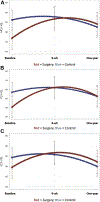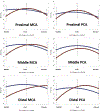Longitudinal Changes in Regional Cerebral Perfusion and Cognition After Cardiac Operation
- PMID: 30253158
- PMCID: PMC7087447
- DOI: 10.1016/j.athoracsur.2018.07.056
Longitudinal Changes in Regional Cerebral Perfusion and Cognition After Cardiac Operation
Abstract
Background: Cardiac operation has been associated with increased risk of postoperative cognitive decline, as well as dementia risk in the general population. Few studies, however, have examined the impact of coronary revascularization or valve replacement or repair operation on longitudinal cerebral perfusion changes or their association with cognitive function.
Methods: We examined longitudinal changes in cerebral perfusion among 54 individuals with cardiac disease; 27 undergoing cardiac operation and 27 matched control patients. Arterial spin labeling magnetic resonance perfusion imaging was used to quantify cerebral blood flow within the anterior communicating artery, middle cerebral artery (MCA), and posterior communicating artery vascular territories before operation and postoperatively at 6 weeks and 1 year. Cognitive performance was examined during the same intervals by using a battery of tests that tapped memory, executive, information processing and upper extremity motor functions. Repeated measures, mixed models were used to examine for perfusion changes and the association between perfusion changes and cognition.
Results: Significant postoperative increases in perfusion were observed at 6 weeks within the MCA vascular territory after cardiac operation (p = 0.035 for interaction). Perfusion changes were most notable in distal territories of the MCA and posterior communicating artery at 6 weeks, with no additional changes at 1 year. Postoperative increases in MCA perfusion at 6 weeks were associated with improved psychomotor speed (β = 0.35, p = 0.016), whereas no important differences were found between the groups in vascular territory perfusion and cognition at 1 year.
Conclusions: Cardiac operation is associated with important short-term increases in MCA perfusion with associated improvements in psychomotor speed.
Copyright © 2019 The Society of Thoracic Surgeons. Published by Elsevier Inc. All rights reserved.
Figures



References
Publication types
MeSH terms
Grants and funding
LinkOut - more resources
Full Text Sources
Other Literature Sources
Medical

